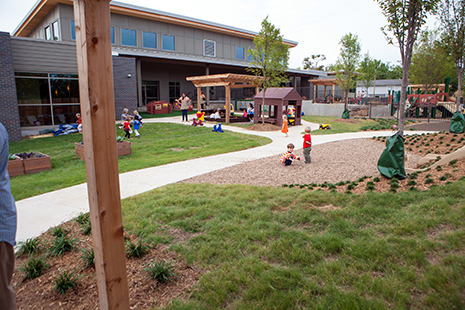FAYETTEVILLE, Ark. – Summer vacation has started for most children, and they are probably looking forward to a time of fewer rules, schedules and expectations. But even vacation can turn to stress for kids when they have to adjust to different routines.
Mardi Crandall, a child development instructor in the Dale Bumpers College of Agricultural, Food and Life Sciences at the University of Arkansas, says this could be surprising to parents.
“Today’s ‘summer off’ may look different to young children than it did to their parents,” said Crandall, who teaches in the School of Human Environmental Science. “For many children today, gone are summer days of free play in the neighborhood, secure days of wandering through shops without supervision and time to chill without direction. Today’s children are often enrolled in all-day summer programs or adjusting to new sitters. Rather than free time to play, they are dealing with the stress of new situations while parents are at work.”
“Sometimes children might help choose a camp or special activity, and then doubt that decision after the first day,” said Vernoice Baldwin, executive director of educational programs at the Jean Tyson Child Development Study Center on campus. “Even though they thought they were prepared, expectations did not match the actual experience. Parents should be prepared to work it out with children to have an alternate plan if the camp or activity is not a good fit. A child’s excitement about a camp and the parent’s desire to provide an enriching opportunity do not always match.”
Crandall and Baldwin have suggestions for parents to help children deal with the realities of summer vacation in 2014.
Prepare children for changes ahead of time.
“Children do not thrive on surprises,” said Crandall. “Parents need to talk about upcoming plans with enthusiasm. Describe what, where and when, and for older children, you may also discuss the why of summer arrangements.”
Children, especially young children, may resist plans, even if they had previously been “kid-approved.”
“Parents may hear ‘my friends won’t be there’ or ‘I don’t like to meet new kids,’” said Crandall. “Meet disapproval with understanding for your child’s perspective. We all want to be heard, even if we don’t get our way.”
Listen to a child’s response and watch for more than words. A distressed child may communicate through body language.
“A quivering lower lip or clinched fist may indicate a child’s true emotions,” said Crandall. “If you see such signs, use that opportunity to open a discussion.”
Never shame children for their emotions.
“Do not dismiss emotion as trivial, or worse, laugh about a child’s distraught feelings,” said Crandall. “What a child feels is legitimate, even if not convenient for parents or socially acceptable. Acknowledge the emotion by saying ‘it sounds as if you may be worried about going to camp.’ That lets children know you get their concerns. When they feel understood, they often share authentically with parents. Honest dialogue is healthy dialogue.”
Offer assurance you support your child in efforts to try something new, but beware. Let children know you have confidence in their ability as you support a lack of confidence. How do you do both at once?
“Act with assurance yourself,” said Crandall. “Recall how you selected this choice for summer with care. Tell children the steps you took. If you met program personnel, say so. If you visited, and you should, give details that will help them look forward to being there.”
The secret is to be confident about the program.
“The more you know, the more confident you are, and that confidence will feed your children’s confidence,” said Crandall.
Discuss how long you will stay when dropping off children and what you will do to depart before the first day of camp.
“Unless your child is very young and totally unpracticed in saying goodbye, you don’t need to hang around,” said Crandall. “Tell children goodbye with confidence and leave the same way. If they have been prepped, they’ve got this.”
Baldwin recommends considering a child’s interest when choosing camps, and says hands-on learning activities in math and science, as well as physical activity should be included.
“Children learn when they move,” said Baldwin. “Movement provides stress release and physical activity contributes to overall health. Children also enjoy honing skills in chosen areas such as basketball, tennis, music, soccer, golf, softball and dance.”
Crandall and Baldwin are involved in instruction and program development at the Jean Tyson Center. The center, which focuses on childcare, lab/school experience and research, serves more than 100 children and is among the 10 percent of all programs nationwide accredited by the National Association for the Education of Young Children. Teachers and staff provide developmentally appropriate education for infants, toddlers and preschoolers.
Topics
Contacts
Mardi Crandall, child development instructor
Bumpers College of Agricultural, Food and Life Sci
479-575-5224,
Robby Edwards, director of communications
Bumpers College
479-575-4625,
